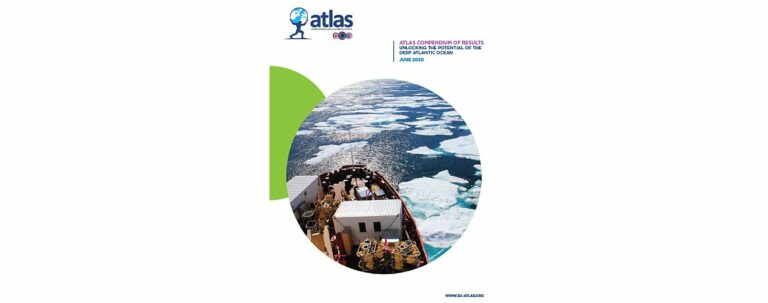The EU-funded Horizon2020 ATLAS Project has published its compendium of results, detailing the key achievements of the four-year project.
The compendium, which captures the ATLAS team’s key outputs, results and activities, contains numerous case studies, statistics and insights from the project, and outlines the steps required to further the project’s ambitious goals through future research.
The ATLAS project is the largest assessment of deep-sea Atlantic ecosystems undertaken to date, and involved over 70 leading scientists from 12 countries. Alongside traditional approaches, ATLAS scientists have used the latest technology and developed new methods and models, including environmental DNA approaches and innovative low-cost camera systems, to search water and sediment samples for known and undiscovered deep-sea species. ATLAS has carried out pioneering research and discovered new benthic communities and species, developing a vast knowledge base that has already contributed to international policies and strategies. This knowledge ensures that deep-sea Atlantic resources are managed effectively, and lays the foundations for future Blue Growth.
To download the full interactive PDF please click here.
ATLAS within the All-Atlantic Cooperation
ATLAS is part of a massive effort on transatlantic cooperation on marine science led by the European Union. The EU Maritime Strategy for the Atlantic Ocean Area, in 2011, and the European Union Action Plan for a Maritime Strategy in the Atlantic Area, in 2013, constituted the inaugural steps towards the development of a transatlantic cooperation initiative for marine science. The All-Atlantic Alliance then got a decisive push with the Galway Statement, signed between the European Union, Canada, and the United States of America, in 2013. This action was followed by the AORA-CSA that launched the construction of a marine science community in the North Atlantic. After the results obtained, the European Union expanded the initiative to the South Atlantic by signing the Belém Statement with Brazil and South Africa, later followed by Administrative Arrangements with Cabo Verde and South Africa. After the terminus of the AORA CSA in March 2020, the construction of the All-Atlantic Ocean Research Community is now being led by the AANChOR CSA, building on the success of the AORA-CSA.
To learn more about the ATLAS Project, please visit eu-atlas.org.

